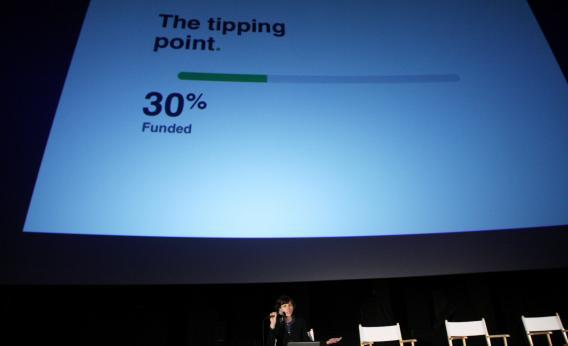It’s been a busy couple of weeks in the world of social media and sexism. The latest company to feel the ire of online activists who are determined to deny sexist content safe haven is the crowdfunding site Kickstarter.
A man name Ken Hoinsky recently launched a Kickstarter campaign to raise $2,000 to publish Above The Game: A Guide To Getting Awesome With Women, a collection of essays on the “art” of the “pickup” he’d written on forums like Reddit. His pitch is a fairly standard zero-to-hero story with a hefty dose of resentment. “I grew up in a small suburb. I sucked at sports and spent a lot of time playing video games and messing around on my computer,” Hoinsky writes in his proposal. “I was always good at making connections with others, but I was riding purely on instinct. Always the nice guy, my first three girlfriends cheated and dumped me for the other guy. Ultimately I ended up getting pretty good with women, finding love, and living life.”
If Hoinsky were a typical pick-up artist, this might only have inspired eye rolling, not outrage. But about ten hours before the end of the funding period for Above The Game, blogger Casey Malone found some of Hoinsky’s posts on “seddit,” the sub-Reddit devoted to pick-up and so-called “seduction” techniques, and archived them in case Hoinsky scrubbed them, which he in fact did.
They include such charming suggestions as: “Decide that you’re going to sit in a position where you can rub her leg and back. Physically pick her up and sit her on your lap. Don’t ask for permission. Be dominant. Force her to rebuff your advances.” And: “Make her push your hand away as you get closer to her vagina.” Also: “Pull out your cock and put her hand on it. Remember, she is letting you do this because you have established yourself as a LEADER. Don’t ask for permission, GRAB HER HAND, and put it right on your dick.”
To be fair to Hoinsky, he does suggest that, “If at any point a girl wants you to stop, she will let you know. If she says ‘STOP,’ or ‘GET AWAY FROM ME,’ or shoves you away, you know she is not interested. It happens. Stop escalating immediately and say this line: ’No problem. I don’t want you to do anything you aren’t comfortable with.’” But it’s a lone bit of caution in what otherwise sounds like a guide to sexual harassment.
Or, as Malone put it in a call to report the project to Kickstarter in the remaining hours before the deadline closed, “This guy is no longer just being weird and creepy on the internet…I am offended as someone who believes in the platform, and more importantly I am offended as someone who believes women shouldn’t be treated this way, and that people who say otherwise CERTAINLY should not profit off saying they should.”
So what could Kickstarter have done? The crowdfunding site might have been able to remove Hoinsky’s proposal on the grounds that it fell under the category of “offensive material (hate speech, etc.); pornographic material; or projects endorsing or opposing a political candidate.” Late last month, after an activist campaign that convinced multiple companies to pull advertising from the site, Facebook pledged to review its hate speech guidelines in order to make it easier to report and remove posts that advocate or celebrate rape and domestic violence. YouTube has experienced similar challenges with community moderation. And Indiegogo, another crowdfunding site, recently shut down a project to produce a 3D-printable gun.
Like those organizations, Kickstarter has review procedures. The company reviews submissions—though only the content of the pages it will set up, and not external but related material, like Hoinsky’s seddit postings—before allowing them to go live. Kickstarter has a team of community monitors who evaluate reports and complaints that suggest projects are in violation of the site’s guidelines, while a small group of trust and safety monitors examines projects for potential fraud (Kickstarter is currently hiring a manager to oversee its trust and safety work). Its broad requirement that funding go to limited-scope projects that fall into an established set of creative categories can be used to exclude proposals that are either outside the site’s purview, or that have the potential to kick up heat for the company. Kickstarter’s guidelines have evolved in the past to respond to the needs of its community, as was the case when the company added rules about hardware and product design to help give backers a sense of how close proposals are to completion. So why didn’t any of these guidelines stop Hoinsky’s project from going forward? Kickstarter declined to comment.
Perhaps Kickstarter and other social media sites wish they didn’t have to take responsibility for what people do with the tools they offer. But when you give people a platform, you’re in business with them. And the time may come when you have to choose between one set of consumers and another. As for Hoinsky’s campaign, it finished up with $16,369, far more than the original $2,000 he’d requested.
